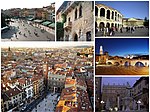Verona trial
1944 in Italy1944 in lawHistory of VeronaItalian Social RepublicTrials in Italy ... and 1 more
Trials of political people

The Verona Trial (Italian: processo di Verona) was a show trial held in January 1944 in the Italian Social Republic (ISR) to punish—by five almost-immediately executed death sentences and one 30-year imprisonment—the members of the Grand Council of Fascism who had committed the offence of voting for Benito Mussolini's removal from power in the Kingdom of Italy and had later been arrested by Mussolini's forces.
Excerpt from the Wikipedia article Verona trial (License: CC BY-SA 3.0, Authors, Images).Verona trial
Largo Don Giovanni Bosco, Verona San Zeno
Geographical coordinates (GPS) Address Nearby Places Show on map
Geographical coordinates (GPS)
| Latitude | Longitude |
|---|---|
| N 45.44 ° | E 10.9883 ° |
Address
Castelvecchio
Largo Don Giovanni Bosco
37122 Verona, San Zeno
Veneto, Italy
Open on Google Maps










